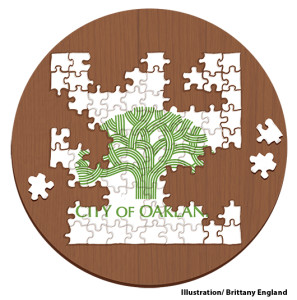 Oakland’s Rules and Legislation Committee discussed issues of redistricting on Thursday, causing Councilmember Larry Reid to become defensive towards his colleagues.
Oakland’s Rules and Legislation Committee discussed issues of redistricting on Thursday, causing Councilmember Larry Reid to become defensive towards his colleagues.
According to the Oakland Charter, the city is required to review the population of all seven districts and determine if redistricting or revision is necessary. The process is essential to ensure that all the districts are “composed of contiguous territory, as equal as possible in population and is geographically compact as possible,” said Amber Macaulay from the City Attorney’s Office.
“We really don’t have to do redistricting if we choose not to do so, right?” asked Councilmember Larry Reid on Thursday.
“The Charter mandates that we do look at redistricting every ten years,” said Amber Macaulay from the City Attorney’s Office. “There really isn’t any safe harbor, the population should be as equal as possible.”
According to the reports, the three districts that have had population deviations of more than 5 percent need to be rebalanced. Councilmember Patricia Kernighan’s District 2 had a change of 6.9 percent, Councilmember Lynette McElhaney of District 3 had 12 percent and Councilmember Kalb of District 1 had 5.4 percent.
The redistricting discussion lasted 45 minutes, with two speakers and a presenter from the National Demographic Corporation. The main objective was for the council to receive an informational report on the legal requirements and standard practices for redistricting of City Council Districts every ten years, including the extent and nature of community outreach and adopting recommendations for council action to begin the 2013 redistricting process in Oakland.
Oakland City Staff had already selected National Demographic Corporation, or NDC, for a contract amount of $40,000. Douglas Johnson, president of NDC said they will use census data and proprietary software to provide demographic information, hold five community meetings to engage with the community and provide online mapping software, which the public can log into and offer personal suggestions about the mapping of the districts.
After several presentations, a motion to move this issue to the city council meeting continued to stall as Kernighan presented the voice of several groups and non-profit organizations that wanted to be considered in the redistricting process.
Anthony Ede, director of the Alliance for Californians for Community Empowerment spoke on behalf of several organizations including the East Bay Housing Group and other community groups.
“Before we proceed with this we should explore if all seven districts should be redistricted versus just three,” said Anthony, reading from a letter from the ACLU. “Before council sets criteria, we would like to make sure that there is broad outreach and is as transparent as possible.”
Councilmember Larry Reid expressed his annoyance about the issue being drawn out and voiced his concern about certain special interest groups that are making the agenda complicated.
“I think those three districts that was outlined is appropriate for us to do. The ACLU can write me a letter every freaking week, I don’t govern my life by what the ACLU thinks is in our best interest,” said Councilmember Larry Reid. “No disrespect to those non profits who have special interests and have their own agendas, I respect them. But we as council need to make a decision that is based on what our staff is saying that makes good logical sense.”
The City Attorney’s office reiterated that the population should aspire to be as equal as possible with some divergences that consider communities of special interest. Furthermore, the redistricting proposal needs to ensure that these communities do not become diluted due to new territories.
“We just need to get this process going and of course we will be revisiting all these concerns, but our deadline is tight and we need a proposal to be voted on by December 31,” said Councilmember Dan Kalb.
All the members of the committee were present with the exception of Councilmember Libby Schaff.







